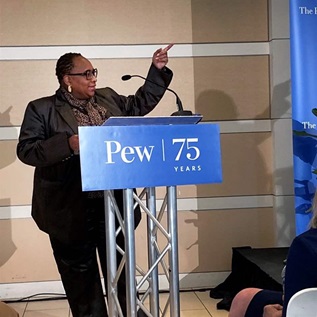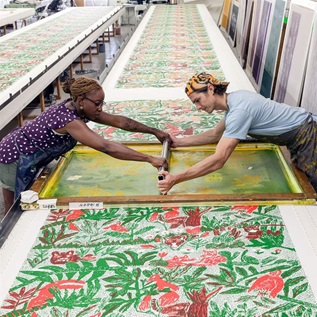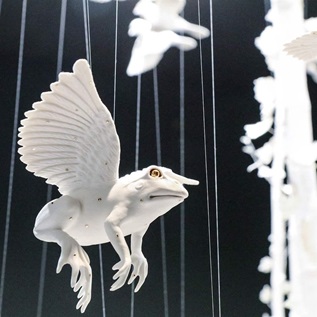The Pew Center for Arts & Heritage Announces 2012 Dance Advance Grant Recipients
Philadelphia, PA- The Pew Center for Arts & Heritage has awarded $812,000 through Dance Advance to 12 dance projects, representing seven individual artists, three dance companies, and two presenting organizations in the Philadelphia area. Two individual artists are first-time grantees; one is a first-time applicant.
These projects demonstrate the Philadelphia dance community's interest in revisiting seminal works by groundbreaking choreographers, commissioning new pieces that involve dynamic and potentially transformative collaborations between traditional and contemporary practitioners, and exploring social issues and cultural identity. This year's funded projects include the metamorphosis of a parking lot in North Philadelphia into a carnival of nature; a premiere by one of the region's brightest young choreographic voices, exploring an underground dance style; and a challenging production of a rarely performed work by an internationally acclaimed ballet master.
Dance Advance Director Bill Bissell notes, “The 2012 grantees explore performance practices that push against traditional boundaries of how and where dances are made, seen, or engaged with by audiences. Their projects reflect changes taking place in the field of dance both nationally and internationally, and connect dance and dancing to the realm of ideas. This has rich implications for both the artform and for Philadelphia audiences.”
The 2012 funded projects in dance include the following highlights:
Merián Soto will conclude her award-winning Branch Dance series with We Are, an outdoor, site-specific performance in North Philadelphia's “El Barrio” neighborhood that invokes and celebrates nature. Audience members will experience an intimate sensory experience that Soto and her dancers will create in this typically urban, congested space.
Jumatatu Poe will create a new work, Private Places, that is steeped in JSette movement—an underground, primarily African-American dance form, marked by tight and often explosive movement. This work asks both audience and performer to get outside of their comfort zones and respond to unexpected movements. In addition to the public performance, a panel discussion on JSette will introduce Philadelphia dance audiences to the dance form and place it within a broader cultural context.
Pennsylvania Ballet's performance of internationally acclaimed artist William Forsythe's Artifact Suite, will mark only the second time the work has been performed in the United States. A technically challenging ballet that is larger in scope and more intricate than any prior Forsythe work the Ballet has presented, Artifact Suite will be staged by two of Forsythe's former dancers and the choreographer himself will travel to Philadelphia for the occasion. A public symposium will examine Forsythe's approach to movement, which pushes the boundaries of classical ballet.
“These projects represent some of the most innovative dance productions that will take place in the region over the coming year,” said Greg Rowe, Director of Culture Initiatives. “Audiences once again have many exciting events—and brilliant performances—to look forward to.”
Dance Advance grants are awarded in all genres of dance to applicants who reside in the five-county region of Southeastern Pennsylvania. Proposals were evaluated in a two-step process by a panel of dance professionals and leaders, according to criteria of artistic excellence, project excellence, and project impact. For full lists of grant adjudication panelists and LOI (Letter of Intent) evaluators, and their respective credentials, please visit www.pcah.us/dance.
Since its inception in 1993, Dance Advance has funded a total of 391 dance-specific projects. These awards represent a value of over $11.4 million invested in advancing artistic achievement in the region's dance communities and bringing outstanding dance programming to local audiences.











